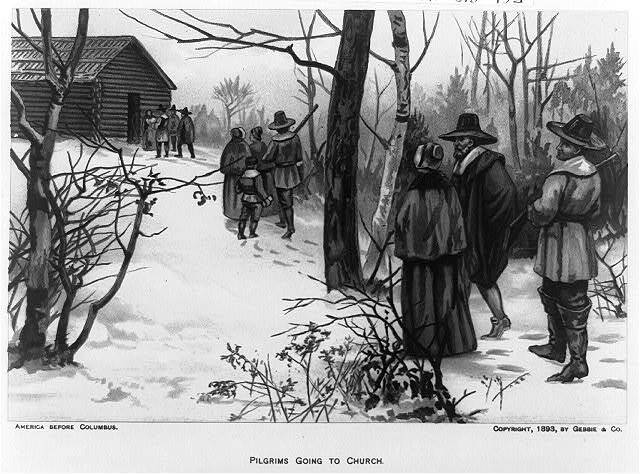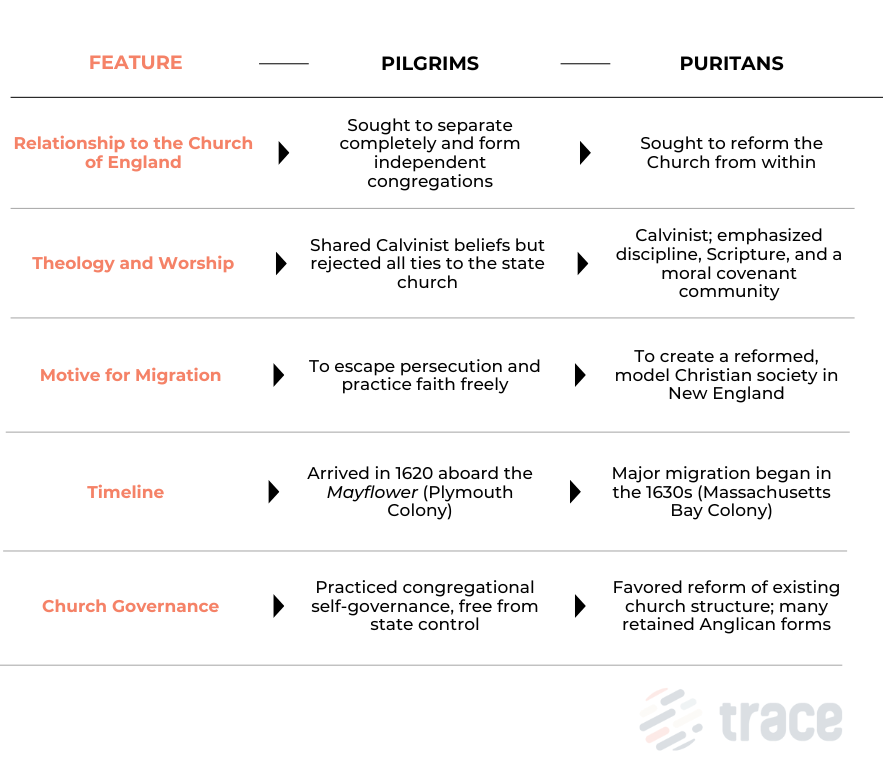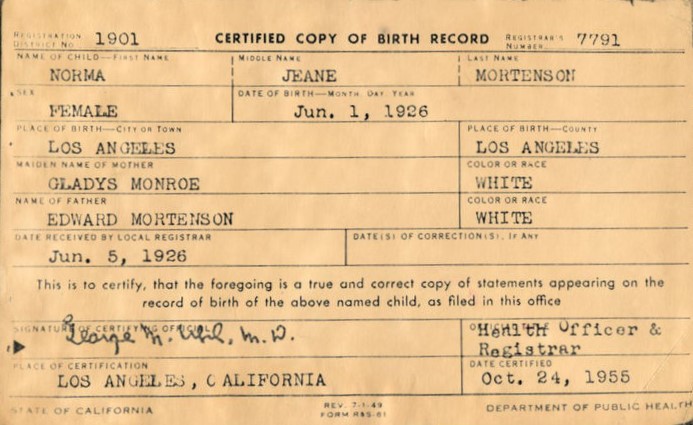
Pilgrims vs. Puritans: Understanding America’s Earliest Religious Divides
When we explore the earliest English settlements in North America, two names often stand out: Pilgrims and Puritans. These groups shared Protestant roots and a devotion to Scripture, yet their approaches to faith and society were distinctly different. Understanding what set them apart helps explain how religion and governance developed in early colonial America.
The Establishment: The Church of England
The Church of England formed during the Protestant Reformation, when King Henry VIII broke ties with the Roman Catholic Church and declared himself head of the Church through the Act of Supremacy in 1534. Although the new church kept many traditional structures such as bishops and liturgy, it also absorbed Protestant beliefs.
Within this hybrid church, some believers felt that too much of the old Catholic influence remained. These reform-minded English Christians would give rise to the Puritans and, later, the Separatists who became known as the Pilgrims.
Who Were the Pilgrims?
The Pilgrims were part of the Separatist branch of English Protestantism, a radical movement that grew out of dissatisfaction with the Church of England. They believed the national church could not be purified and that true believers must separate completely to form independent congregations.
Persecution at home led many of these Separatists to flee first to the Netherlands and then across the Atlantic. In 1620, they joined a larger group of settlers and set sail aboard the Mayflower. The ship carried 102 passengers in total. About thirty-five were Separatists from the congregation that had fled to Leiden in the Netherlands. The rest were merchants, craftsmen, and laborers recruited for the journey, whom the Separatists referred to as “the Strangers.”
Before landing, the passengers signed the Mayflower Compact, an agreement that established a framework for self-government and cooperation among all aboard. This compact marked a defining moment in the development of democratic principles in America.
The Pilgrims’ faith was rooted in Calvinist theology, but their focus was on freedom of conscience and worship. Their small, self-governing community became a powerful symbol of religious independence and endurance in the New World.
Who Were the Puritans?
The Puritans were a reform movement that sought to purify the Church of England from within. They believed that the English church retained too many elements of Catholicism and needed a stricter adherence to biblical teaching.
Puritanism emphasized individual conversion, moral discipline, and covenant relationships between God and believers. Most Puritans were non-separating, meaning they wanted to remain part of the Church of England while transforming it into a more thoroughly Protestant institution.
During the early 1600s, growing frustration with the pace of reform and religious pressures in England led many Puritans to migrate to North America. Beginning in 1630, thousands settled in Massachusetts Bay, determined to build a “godly commonwealth” that could serve as an example for the world.
Puritans valued education, community order, and moral integrity. Their influence shaped the laws, schools, and governance of New England for generations.

Similarities and Overlaps
Despite their differences, the Pilgrims and Puritans shared deep common ground. Both emerged from the English Reformation, embraced Calvinist theology, and sought to align worship with biblical principles. Both believed in covenant communities and moral responsibility as foundations for Christian life.
In New England, their similarities became more pronounced. Puritan congregations in Massachusetts eventually adopted a church structure similar to that of the Pilgrims, built around local governance and communal responsibility.
Why the Distinction Matters
Understanding the distinction between the Pilgrims and the Puritans adds depth to the story of early colonial America.
- Historical clarity: It reveals that Plymouth and Massachusetts Bay represented two distinct expressions of English Protestant dissent.
- Religious freedom: The Pilgrims’ complete separation from the state church highlighted a growing commitment to individual conscience.
- Social order: The Puritans’ structured community life shaped colonial education, law, and public morality.
- Cultural legacy: Together, they influenced enduring American ideas about faith, governance, and self-determination.
In Summary
- The Pilgrims were Separatists who left the Church of England entirely, creating an independent and self-governing community at Plymouth in 1620. Their Mayflower voyage included 102 passengers, a mix of Separatists and “Strangers” united by necessity and faith.
- The Puritans were reformers who stayed within the Church of England, striving to purify it and later building disciplined, faith-based colonies in New England.
- Both shared Calvinist roots, a devotion to Scripture, and a desire to build godly societies, though their paths to achieving those goals diverged.
Together, these groups shaped the earliest spiritual and political ideals of the American colonies and left a lasting mark on the nation’s identity.
Discover Your Pilgrim or Puritan Roots
If your ancestors arrived in early New England, there’s a chance they were among the Pilgrims, Puritans, or the “Strangers” who joined them on the Mayflower and beyond. Tracing those origins can uncover remarkable stories of courage, faith, and community that shaped the earliest days of America.
At Trace, our team of professional genealogists specializes in colonial and early American research, including those that made Massachusetts their home. We can help you identify whether your family connects to these historic migrations and bring their stories to life through detailed, documented lineage.
Begin your journey and Contact Trace today!




